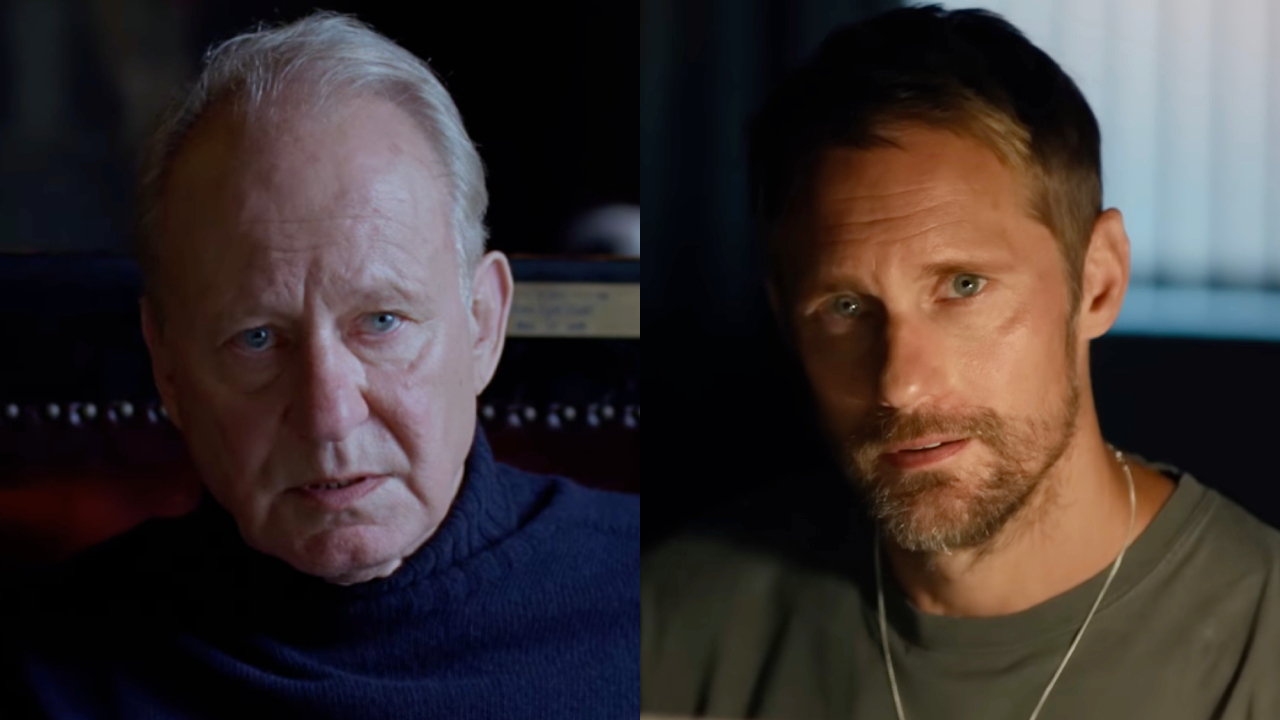‘One Part Jerry, One Part Michael, And The Rest Is Yours’: John Paesano On Wes Ball’s Notes For The Kingdom Of The Planet Of The Apes Score
Musical history played an important part in Kingdom of the Planet of the Apes' overall package.
While the Planet of the Apes franchise doesn’t span nearly as much time as the events depicted in the series, there’s still an extensive history of influences at work. As the legacy of some of the best sci-fi movies continued forward with the release of director Wes Ball’s Kingdom of the Planet of the Apes, those influences were felt pretty strongly from top to bottom.
One party that knows that rather well is composer John Paesano, whose work on the 2024 movie had some pretty specific roots in Apes series tradition. And as John recalled his Maze Runner collaborator’s notes, composers Jerry Goldsmith and Michael Giacchino had a huge hand in laying down the musical groundwork for the potential road ahead.
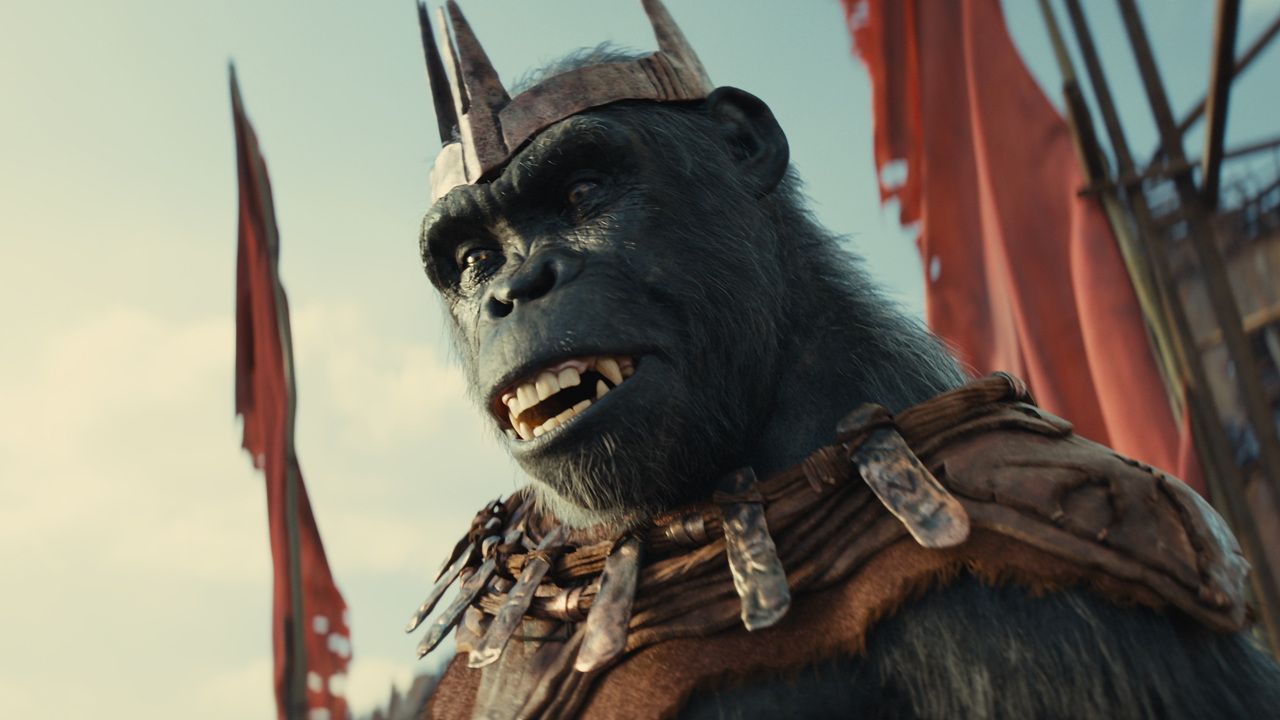
Wes Ball’s Notes To John Paesano For Kingdom Of The Planet Of The Apes Score
The intent that Wes Ball put into play for his continuation of Caesar’s Planet of the Apes timeline has been fascinating to follow ever since Kingdom of the Planet of the Apes was announced. And much like the story to the fourth new chapter in the modern incarnation of that 20th Century Fox classic, the musical approach was a child of three worlds.
Not only did the journey of young Noa have to bridge the gap between the events of War for the Planet of the Apes and the 1968 original, it also had to find room to be its own unique installment. That trifold approach was made readily apparent when I spoke with John Paesano, as he shared with CinemaBlend the following formula that perfectly encapsulates this film’s DNA:
So I think Wes told me, he said, ‘Okay, it needs to be one part Jerry, one part Michael, and the rest is yours.’ That was kind of the idea. And the trick was like, ‘Okay, how do we do this?’ And I think the cool thing that I discovered was that Jerry not only wrote a score for Planet of the Apes, but he developed an actual language, a musical language to that film. … So it's not that I literally had to take themes from them. I was able to kind of learn the language of both those films, and then figure out how do we express 'em to kind of bring that fan base along, honor the Jerry Goldsmith score that came before us in 1968, and then give us a way to push forward on it.
For the piece of the puzzle that came from late composer Jerry Goldsmith, that language that Paesano had to learn was called “serialism.” John went into deeper detail as to what that entailed, but he also shared his thoughts on Michael Giacchino’s music for Dawn and War for the Planet of the Apes, which basically became the most recent touchstone of reference.
John Paesano’s digging into the work of a fellow Spider-Man composer certainly showed itself in his work, with one cue in particular landing a direct connection to Giacchino’s work. Continuing to discuss this process with me, Paesano basically noted that he naturally had to make the language of the last two Apes films work alongside Jerry Goldsmith’s themes and whatever he decided to write to make up his part of the pie.
Sure enough, one cue from Dawn of the Planet of the Apes was the key to unlocking the more recent side of the puzzle. It was for good reason too, as Paesano's Kingdom of the Planet of the Apes track “Discovery” played over an important scene that was vital to setting the table for the future.
Your Daily Blend of Entertainment News
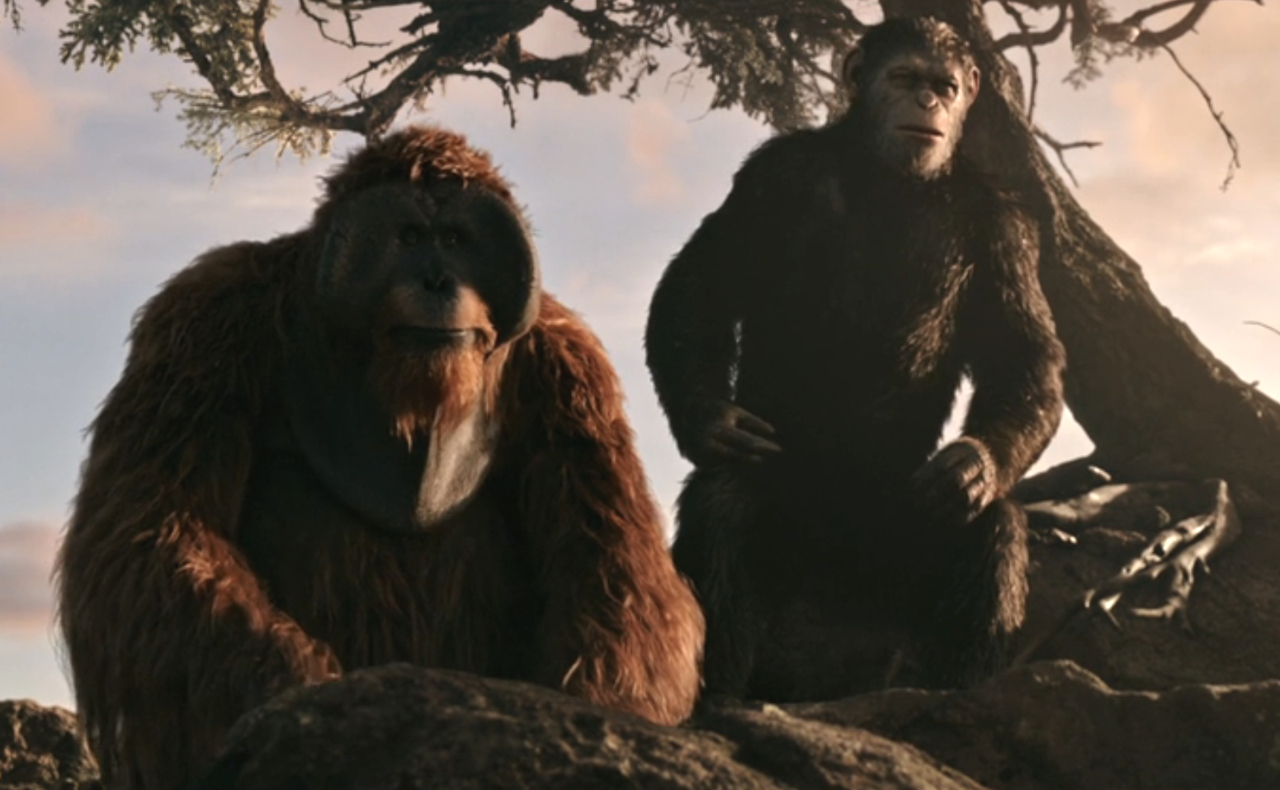
The Michael Giacchino Cue That Helped Define Kingdom Of The Planet Of The Apes’ Musical Approach
With the decision made for Kingdom of the Planet of the Apes’ heartbreaking opening to start our story at Caesar’s funeral, shades of Michael Giacchino’s musical cues from the past were invoked through John Paesano’s score. Obviously that was a no-brainer, as that scene’s ultimate intent was a microcosm of what Paesano and director Wes Ball were trying to do.
Invoking past history while showing the way forward, that moment also opened the door for an opportunity for Paesano to adopt musical language Michael Giacchino had established in the previous films to inspire new language for moving the franchise forward while still honoring the past world of Dawn and War.
Shared below is John Paesano’s “Discovery,” from the Kingdom of the Planet of the Apes score. See if you can clock with Giacchino track is referenced before we move on:
It was quite fitting for Michael’s tune “Level Plaguing Field,” the opening melody used to set the stage for Dawn of the Planet of the Apes’ post-pandemic era, was also reflected in Kingdom’s starter song “Discovery.” However, instead of playing out the originally downbeat and apocalyptic nature of that very punnily-named song, Paesano inverts expectations to reflect the promise of what’s to come.
That promise is what gives way to Kingdom of the Planet of the Apes’ musical landscape, as the bittersweet, but ultimately hopeful start is so different from what we experienced in the previous two films. As John Paesano explained how his collaboration with Wes Ball got started, you could see why honoring both major musical eras of Apes history were so important:
That cue especially was an inspiration for [us.] I think when Wes and I had gotten together early in the process, that was kind of the marching order. Wes is a huge film score enthusiast, like huge. … I was definitely not the most qualified person to do The Maze Runner films, you know what I mean? Like, I was young, I was coming up, it was one of my first big wide released films.
Music nerds are just as effective as story nerds when it comes to playing with the toys they grew up loving. In an industry where everyone swimming in the lofty circles of greats like Hans Zimmer, Daniel Pemberton and, of course, Michael Giacchino, can write great music. Even John Paesano admits to one key factor in landing the perfect gig.
That extra key is the relationship between composer and director, something that saw Wes Ball not only giving John Paesano his cinematic start, but also saw the two reprise their relationship on the aborted Mouse Guard film. However, that's also the sort of association that brought Michael Giacchino into the mix, as his pairing with director Matt Reeves saw him sign up for the completion of the Caesar Trilogy.
In working models like that, you could say all involved speak each other’s language. And appropriately enough, that ties into John Paesano’s experience with the music of the late great Jerry Goldsmith, which saw him learning yet another melodic lingo required to bring this world to life.
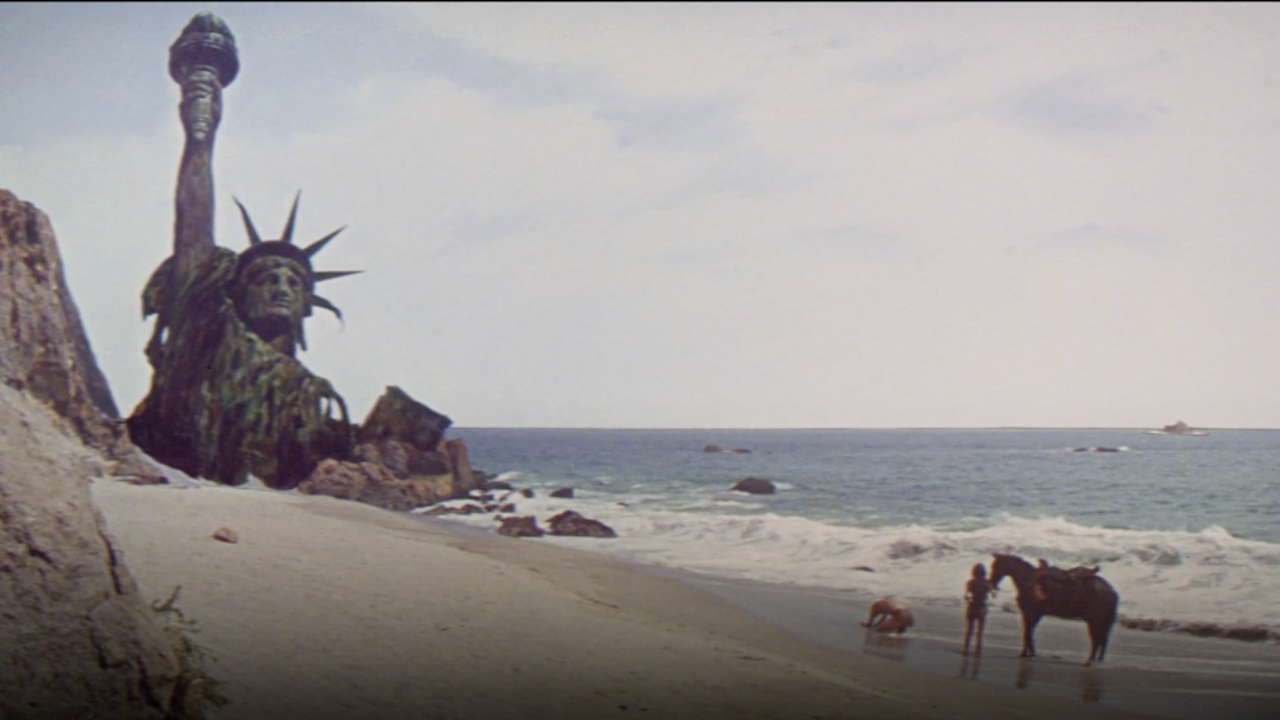
What John Paesano Learned About Jerry Goldsmith’s ‘Serialism’ For The Kingdom Of The Planet Of The Apes’ Score
John Paesano admitted what any devoted fan of the Planet of the Apes movies would tell you from frame one: including the influence of the 1968 original was “never a question.” Jerry Goldsmith’s music was always going to find a way into the mix, and that much was proven to be true even during Michael Giacchino’s turn at bat.
But when it came to really digging into what made Jerry’s music so iconic, it all came down to one word: “Serialism.” Describing this school of musical thought in a top down approach, here’s how Paesano sums up Serialism:
[Jerry] really did develop a language for the plan of the Apes score, and it's got a very distinct kind of architecture to it. And there are rules that you kind of have to follow with a tone row. And he really wrote it in this kind of avant-garde style called Serialism. It's some modern classical discipline that he wrote that score in. So what I did is I kind of delved into that language and I tried to understand it and learn it.
Apes past echoes quite strongly through the scene teased in the Kingdom of the Planet of the Apes trailer, in which Proximus Caesar’s lieutenants hunt down ape dissidents and humans alike. The moment could quite possibly be the strongest connection between Planet of the Apes and its most recent descendant, and you can hear it through the instrumentation that John Paesano employs throughout its musical accompaniment.
As with any art form, describing the approach only works so much. So if you’re interested in hearing this “avant-garde” style at work, listen to the Kingdom of the Planet of the Apes cue provided below, aptly titled “Human Hunt”:
The more I listen to the Kingdom of the Planet of the Apes score, the more I find to love about it. With all of the rich textures layered in from the past and present eras, the story being told by John Paesano’s music and Wes Ball’s helming skills only becomes stronger. Should the future provide further returns to this fictional world, let’s hope that this pair of artistic brothers return once more to continue adding further texture to this iconic tale.
Those of you who want to jump back into the musical and thematic history of the Planet of the Apes saga, your Hulu subscription is your ticket to getting back into the swing of things. And of course, if you’re looking for the Kingdom of the Planet of the Apes, you just need to make your way to the nearest movie theater, as that picture continues to clean up in theatrical exhibition.
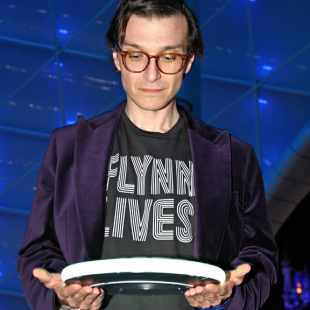
Mike Reyes is the Senior Movie Contributor at CinemaBlend, though that title’s more of a guideline really. Passionate about entertainment since grade school, the movies have always held a special place in his life, which explains his current occupation. Mike graduated from Drew University with a Bachelor’s Degree in Political Science, but swore off of running for public office a long time ago. Mike's expertise ranges from James Bond to everything Alita, making for a brilliantly eclectic resume. He fights for the user.


